Recent Research (2020 - Present)
Status of Women: Colorado Snapshot - The Women's Foundation of Colorado and Institute for Women’s Policy Research 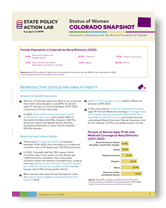
This report details the economic status of Colorado women that will guide our priorities during the 2026 legislative session and beyond.
H.R. 1 and the Feminization of Poverty - The Women's Foundation of Colorado and Colorado Fiscal Institute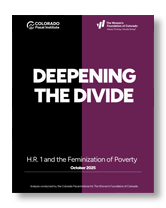
This brief explores the economic impacts of H.R. 1 (also known as the “One Big Beautiful Bill Act,” or OBBBA) through a gender equity lens, examining how selected provisions disproportionately affect women’s economic security and ability to thrive. Changes to taxation, public revenues, and spending priorities impact the resources available for programs that support women and families, including child care, health care, and income supports. By analyzing how the bill’s fiscal impacts intersect with gendered economic realities, the brief will identify how H.R. 1 deepens the systemic drivers of women’s poverty and highlight opportunities to promote gender-equitable economic outcomes.
H.R. 1 and the Feminization of Poverty | Report Brief - The Women's Foundation of Colorado and Colorado Fiscal Institute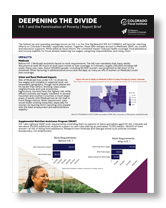
The federal tax and spending package known as H.R. 1, or the One Big Beautiful Bill Act (OBBBA), will have far-reaching effects on Colorado’s families—especially women. Together, these bills reshape access to Medicaid, SNAP, tax credits, and education supports. While billed as fiscal reform, the combined impact reduces health coverage, food assistance, and income stability for those already balancing low wages, caregiving responsibilities, and rising costs.
Colorado's Equal Pay for Equal Work Act is Closing the Gender Gap - The Women's Foundation of Colorado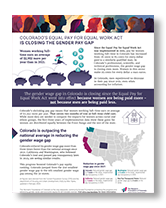
The Women’s Foundation of Colorado new research brief shows the state’s Equal Pay for Equal Work Act is working. Since the law was implemented in 2021, pay for women working full-time in Colorado increased from 78 cents to 85 cents for every dollar paid to similarly qualified men.
WINcome Evaluation & Learning: Year 2 Process & Impact Report - The Women's Foundation of Colorado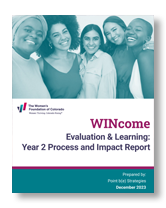
In WINcome year two, The Women’s Foundation of Colorado again partnered with Point b(e) Strategies to evaluate the WINcome grant. The second year’s evaluation of WINcome sheds light on the work of grant partners providing services and cash assistance while working on systems change toward more money for more women. It also illustrates grant partners’ experiences working with WFCO as a funder-partner and within the philanthropic sector. The need for trust-based, flexible funding for cash assistance and related policy work is clear and provides further evidence for this funding structure and focus for the entire philanthropic sector.
WINcome Year 2 Evaluation: Executive Summary - The Women's Foundation of Colorado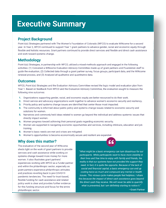
This WINcome Year 2 executive summary highlights the key outcomes measured in the second year and the key impacts of the grant model on grant partners, systems changes and broader narratives about women, and participants receiving flexible cash assistance through WINcome grant partners.
Cash in Colorado: A Landscape Analysis of Colorado Direct Cash Transfers - The Women's Foundation of Colorado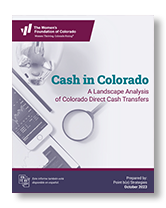
The Women’s Foundation of Colorado firmly believes in direct and flexible cash assistance as a financial tool that advances women’s economic security and opportunity. Through investments in our WINcome grantmaking strategy, we have learned just how significant cash assistance is to supporting Colorado women and their families in meeting their basic needs, addressing emergencies, and advancing economically on their terms. WFCO is not alone in our commitment to direct and flexible cash assistance and there are many programs across the state distributing cash assistance to community members. We partnered with Point b(e) Strategies to review the current landscape of Colorado’s various cash assistance efforts.
Efectivo en Colorado: Análisis de la situación actual de las transferencias directas de efectivo en Colorado - The Women's Foundation of Colorado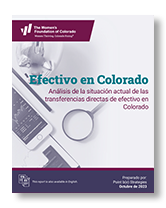
La Fundación de mujeres de Colorado (WFCO) cree firmemente en la asistencia directa y flexible en efectivo como herramienta financiera que promueve la seguridad y las oportunidades económicas de las mujeres. A través de inversiones en nuestra estrategia de subvenciones WINcome, hemos aprendido cuán importante es la asistencia en efectivo para ayudar a las mujeres de Colorado y sus familias a satisfacer sus necesidades básicas, abordar emergencias y avanzar económicamente en sus términos. WFCO no está sola en nuestro compromiso de brindar asistencia directa y flexible en efectivo y existen muchos programas en todo el estado que distribuyen asistencia en efectivo a los miembros de la comunidad. Nos asociamos con Point b(e) Strategies para revisar la situación actual de los diversos esfuerzos de asistencia en efectivo de Colorado.
WINcome Evaluation & Learning: Process & Impact Report - The Women's Foundation of Colorado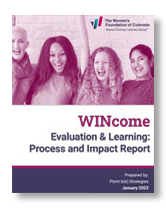
WINcome grantmaking program’s overall priority is to advance gender, racial, and economic equity through flexible and holistic resources. Point b(e) Strategies partnered with The Women’s Foundation of Colorado to evaluate the WINcome program. To help guide and inform the evaluation, Point b(e) Strategies facilitated regular meetings with an advisory committee consisting of grant partners and key WFCO staff from the WINcome program. In addition to a program evaluation, Point b(e) Strategies developed storytelling pieces for WINcome based on data from the evaluation.
Women & Girls of Color Fund Evaluation & Learning: Process and Impact Report - WFCO 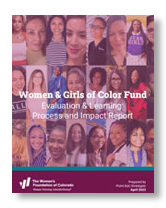
The Women and Girls of Color Fund is a community-developed, community-led field-of-interest fund dedicated to investing in and partnering with women-of color-led organizations that are working to advance the economic security of Colorado women, nonbinary people, trans people and girls of color. In 2022, the fund supported 38 women of color leader grantees. Point b(e) Strategies partnered with The Women’s Foundation of Colorado to evaluate the Women and Girls of Color Fund’s first year.
Ensure Equal Pay for Equal Work - The Women's Foundation of Colorado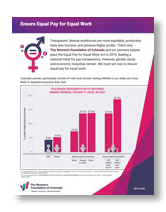
Transparent, diverse workforces are more equitable, productive, have less turnover, and produce higher profits. That’s why The Women’s Foundation of Colorado and our partners helped pass the Equal Pay for Equal Work Act in 2019, leading a national trend for pay transparency. However, gender, racial, and economic inequities remain. We must act now to ensure equal pay for equal work. Leer en español
WAGES Final Learning & Evaluation Report 2021-2022 - The Women's Foundation of Colorado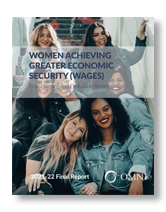
This Year 4 Final Report provides cumulative information on the women served by DS grantees from the beginning of the grant through March-April 2022; the strategies and tactics that direct service and policy advocacy grantees implemented; and learnings from these efforts. When reading this report, please note that “grantees” will be used to indicate direct service and policy advocacy organizational representatives, and “participants” will be used to describe the women who utilized services and supports through the WAGES direct service organizations.
WAGES Final Learning & Evaluation Report Executive Summary- The Women's Foundation of Colorado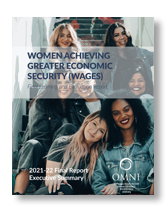
This final executive summary report provides an overview of key learnings from the evaluation over the four years of the grant. Overall, WAGES DS providers served 1,226 diverse participants. When considering that family members also benefit from women improving their economic security and well-being, an estimated 4,056 individuals were reached in total.
Progress of the WAGES Grantee Cohort 2020-21 Annual Report - The Women's Foundation of Colorado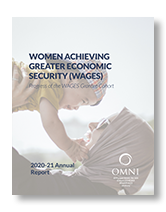
This report provides updates and learnings from WAGES' third year of programming (April 2020-March 2021), which coincided with the COVID-19 outbreak and subsequent school and business closures and stay-at-home orders. Throughout Colorado and the nation, the pandemic is having dramatic effects on women, especially women of color, including loss of jobs or reduced hours, increased child care responsibilities, challenges meeting basic needs like housing and food security, and increased stress and mental health needs.
Progress of the WAGES Grantee Cohort 2020-21 Executive Summary- The Women's Foundation of Colorado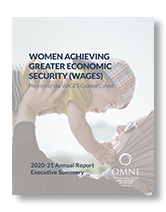
This report provides updates and learnings from WAGES' third year of programming (April 2020-March 2021), which coincided with the COVID-19 outbreak and subsequent school and business closures and stay-at-home orders. Throughout Colorado and the nation, the pandemic is having dramatic effects on women, especially women of color, including loss of jobs or reduced hours, increased child care responsibilities, challenges meeting basic needs like housing and food security, and increased stress and mental health needs.
The Women and Families of CO 2020 Relief Fund Report - The Women's Foundation of Colorado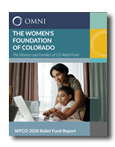
WFCO implemented the Women and Families of CO Relief Fund in April through June of 2020 to rapidly and responsively distribute grants to 501(c)(3) and other tax-exempt organizations that were addressing the emergency needs of Colorado women and their families who were most impacted by COVID-19. Funds were awarded to 108 direct service, policy advocacy, and women-led social venture organizations across 24 Colorado counties. A survey was disseminated in August and September of 2020 to learn more about how funds were used and their perceived impacts.
The Future of Work: COVID 19's Impact on Women - The Bell Policy Center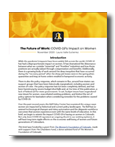
While the pandemic’s impacts have been widely felt across the world, COVID-19 has had a disproportionate impact on women. It has dramatized the dissonance between what we consider “essential” and “frontline” industries and how those positions are actually valued through compensation and benefits. Additionally, there is a growing body of work around the deep inequities that have occurred during the “recovery period” after the sharp job losses seen in the spring when quarantine and stay-at-home orders resulted in hampered economic activity.
The Cost of Failing to Invest in Women 2020 - The Women's Foundation of Colorado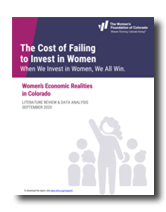
This 2020 report aims to develop an initial understanding of the economic security of women in Colorado—what economic security means, why it is significant, what are the barriers deterring its achievement, and how to promote it. The objectives of this research study are to create a better understanding of women’s economic realities in Colorado—backed by relevant literature and current data—and to develop a research framework to answer questions in regard to women’s economic security.
Women are critical to the future of work and the stability and growth of Colorado’s economy. In 2018, the Bell Policy Center looked at the changing world of work from a gender lens, including trends in automation and emerging technology, the growth in alternative work arrangements, and changing education and training needs. This brief builds on that work by taking a closer look at two aspects of Colorado’s learning and work environment for women: Attainment in two- and four-year degree programs and growth in women-dominated professions.
Understanding the TRUE costs of living in Colorado for diverse family formation is critical to our work. With the support of The Women's Foundation of Colorado, WAGES grantee Colorado Center on Law and Policy (CCLP) released the sixth edition of the Self-Sufficiency Standard and accompanying reports Overlook and Undercounted and Exploring Economic Security Pathways in Colorado, funded by The M&I Charitable Giving Fund, a donor-advised fund held at WFCO.
Understanding the TRUE costs of living in Colorado for diverse family formation is critical to our work. With the support of The Women's Foundation of Colorado, WAGES grantee Colorado Center on Law and Policy (CCLP) released the sixth edition of the Self-Sufficiency Standard and accompanying reports Overlook and Undercounted and Exploring Economic Security Pathways in Colorado, funded by The M&I Charitable Giving Fund, a donor-advised fund held at WFCO.
Understanding the TRUE costs of living in Colorado for diverse family formation is critical to our work. With the support of The Women's Foundation of Colorado, WAGES grantee Colorado Center on Law and Policy (CCLP) released the sixth edition of the Self-Sufficiency Standard and accompanying reports Overlook and Undercounted and Exploring Economic Security Pathways in Colorado, funded by The M&I Charitable Giving Fund, a donor-advised fund held at WFCO.
Colorado’s economy and Colorado families depend on working women. The future of work will depend on them, too, yet Colorado women cannot always depend on our current workplace policies, regulations, politics, and societal norms.
In March 2018, WFCO sponsored the release of “The Economic Status of Women in Colorado” fact sheet, researched and written by the Institute for Women’s Policy Research (IWPR). The report shows some signs of economic progress for women in Colorado, but unfortunately, substantial disparities remained or even worsened since IWPR’s research in 2015.
The Women's Foundation of Colorado created This Is What STEM Looks Like! to introduce parents, caregivers, and educators to the many opportunities that STEM can provide for girls and women. In this guide, you’ll find resources to help girls explore those opportunities and tools to inspire, motivate, and prepare young women to thrive in STEM careers.
Research over the past decade has demonstrated consistently that companies that hire and retain a more inclusive workforce benefit in many ways, including improved operational and financial performance and increased innovation. Yet, while women make up 46 percent of the total Colorado workforce, they comprise less than a third of STEM workers. And, not only do women enter STEM less often than men, they leave STEM careers more often.
The report examines how increases to the minimum wage impact earnings, poverty, and gender and racial equality. This research also investigates the potential impact on child care affordability and families’ eligibility for public support programs and highlights policy considerations for Colorado lawmakers on how to best support Colorado women and families in achieving economic self-sufficiency.
Leading Colorado's Child Care and Education Workforce, executed by Qualistar Colorado with support from The Women’s Foundation of Colorado, identifies primary characteristics of professionals who lead early care and education centers and preschools. Included with research results are recommendations that aim to support leaders as they manage change and lead improvements to the quality, access, and affordability of their critical services for families, young children, and their communities.
Women in Colorado, as in the nation overall, have made substantial progress toward economic equality over the last several decades, but still lag behind men in important ways. Women earn less than their male counterparts, are more likely to live in poverty, and are less likely to own businesses. Even in areas where women’s status has advanced, there is room for improvement.
The Women’s Foundation of Colorado sponsored the the 2015 release of The Status of Women in the States research report by the Institute for Women's Policy Research (IWPR).The report presents hundreds of data points for each state across seven areas that affect women’s lives: employment and earnings; political participation; poverty and opportunity; reproductive rights; health and well-being; work and family; and violence and safety. Read the full report.
The Women's Foundation of Colorado sponsored The Self-Sufficiency Standard for Colorado 2015 and Overlooked & Undercounted 2015: Struggling to Make Ends Meet prepared by the Colorado Center on Law and Policy, which defines the income needed to realistically support a family, without public or private assistance. For most workers throughout Colorado the Self-Sufficiency Standard shows that earnings well above the official Federal Poverty Level are still far below what is needed to meet families' basic needs.
The Women's Foundation of Colorado sponsored The Self-Sufficiency Standard for Colorado 2015 and Overlooked & Undercounted 2015: Struggling to Make Ends Meet prepared by the Colorado Center on Law and Policy, which defines the income needed to realistically support a family, without public or private assistance. For most workers throughout Colorado the Self-Sufficiency Standard shows that earnings well above the official Federal Poverty Level are still far below what is needed to meet families' basic needs.
In 2013, The Women’s Foundation of Colorado produced a comprehensive research report titled The Status of Women & Girls in Colorado. Throughout the research phase for that report, many questions and concerns about child care access and affordability were raised. In particular, single mothers were found to be struggling with the price of child care. As a direct result, The Women’s Foundation of Colorado provided a grant to Qualistar Colorado, in partnership with the Colorado Children's Campaign to investigate and address the barriers to affordable child care.
This research informs our work finding innovative and meaningful ways to advance women in all facets of life across our state. In preparation for this project, we conducted a listening tour and worked with research organizations throughout the state of Colorado to assess the extent to which current research initiatives were using a gender lens and covering key issue areas of concern to Colorado’s women and girls.